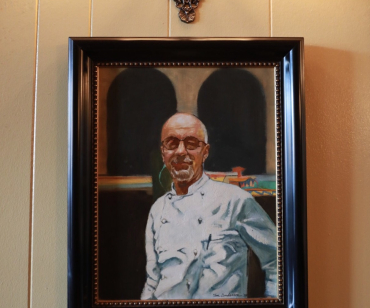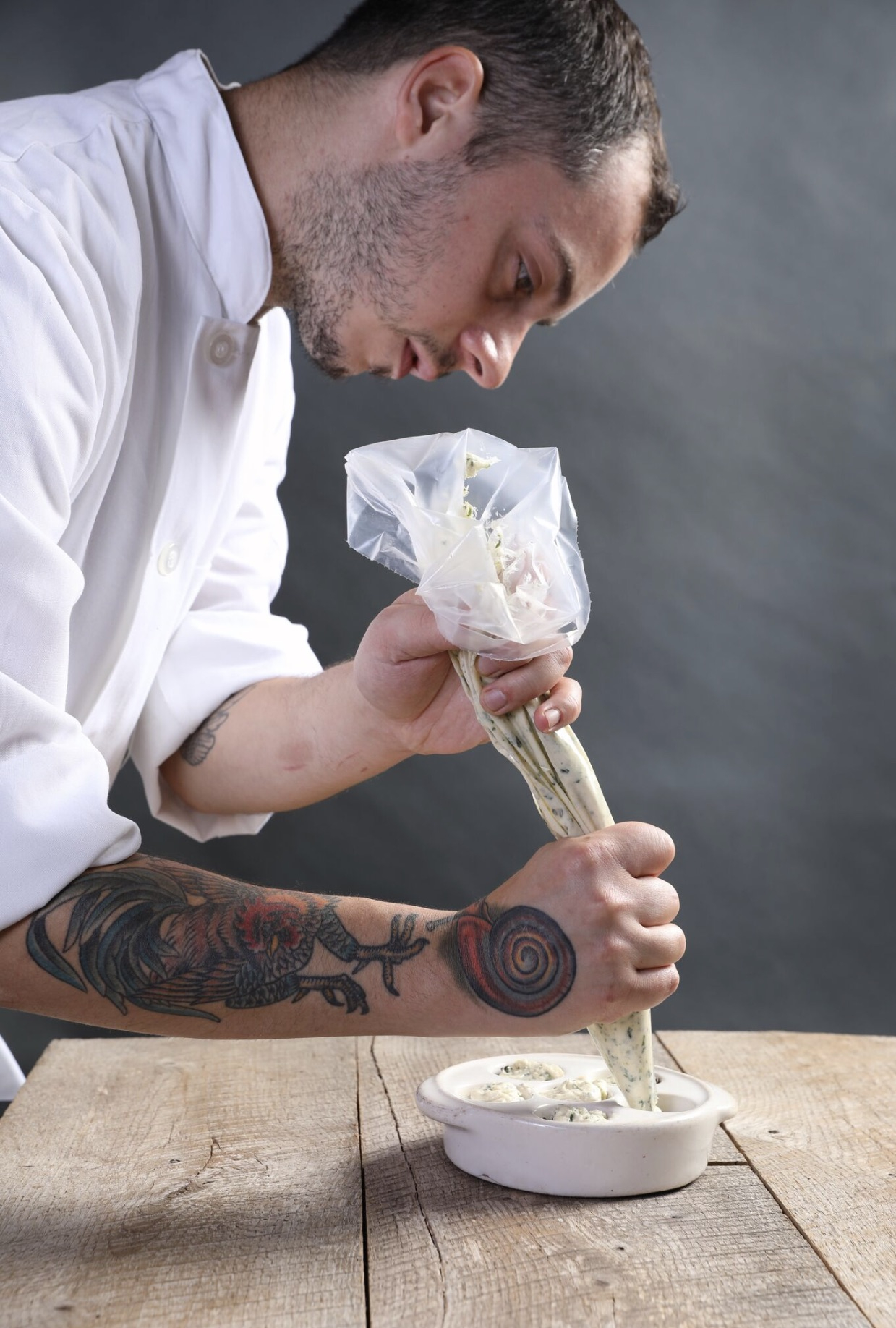Chefs
At Chicago’s Iconic Le Bouchon, Unexpected Loss Prompts a Younger Generation to Shine
Nothing quite compares with the magic of Monday nights at Le Bouchon, the perpetually packed French bistro in Chicago. It’s half-price wine night and (unofficial) industry night, which charges the narrow dining room with the kind of ebullience you’d expect on a Friday or Saturday. The lively assemblage is peppered with industry pros from Chicago’s hottest eateries—among them HotChocolate executive chef/owner Mindy Segal, Kumiko’s creative director Julia Momose, Brindille’s Carrie and Michael Nahabedian and El Che Steakhouse chef/owner John Manion—who often make this their off-night hangout.
Chef/Co-Owner Oliver Poilevey likes to think he and his brothers contribute to the vibe, since Monday is the only night of the week when all three work service. (The family also owns La Sardine in the city’s West Loop.) Bespectacled, grinning Henri, 25, helms the host stand and redheaded sommelier Nicolas, 27, circulates the room popping bottles while Oliver, 31, works the line, the sleeves of his chef’s coat pushed up to display colorful forearm tattoos.
“It’s something pretty special,” Oliver says. “Everyone’s all tight together feeling happy and at home. It’s the place to be, and I’m proud of that.”
In fact, on most nights Le Bouchon exudes the kind of intoxicating atmosphere restaurant owners would pay a hefty price to capture, but which developed organically over the three decades this iconic eatery has occupied a slender brick storefront in the Bucktown neighborhood. The Poilevey brothers represent the second-generation link of an ownership chain dating back to 1993, when their late parents, Jean-Claude and Susanne Poilevey, opened Le Bouchon, followed by La Sardine in 1998—and pioneered French home-style cooking in Chicago.
The larger, wood-trimmed La Sardine watched the last vestiges of the West Loop’s meatpacking district fade as trendy chef-driven spots like Girl & the Goat begot mini-restaurant empires and now a slew of upmarket chain restaurants, boutique hotels and shiny multi-use retail and condo buildings. Forty-seat Le Bouchon, bedecked in tile and wood with a tin-print ceiling, is arguably the more popular, dating back to when the now-gentrified Bucktown neighborhood “felt like the edge of the world,” says Manion, who started coming for half-price wine night as a young cook in the mid-1990s.
“At that time, (Charlie) Trotter was at his apex, but if you knew, then Jean Banchet (the late master chef and owner of acclaimed, now-shuttered Le Francais) and Jean-Claude were the fucking guys,” Manion says. “We were all trying to be French cooks then, so it was a destination, a temple, just an epicenter of food culture.”
Other high-profile fans include former President Barack Obama, who compared its charms to “a little Parisian cafe” when he was a young senator appearing on PBS’s restaurant review program “Check, Please!” in 2001. Longtime customer and former Chicago mayor Rahm Emanual remarked after Jean-Claude’s death that his “artistry in the kitchen and entrepreneurial spirit left an indelible mark on Chicago’s culinary landscape.”
Jean-Claude’s sudden passing in 2016 followed by Susanne’s death from cancer last year forced the reins into the three brothers’ hands far sooner than they expected. Prematurely losing both parents not only awoke a genuine appreciation for the impressive longevity of both restaurants, but also the realization that evolving is essential to surviving this business—even if it means contending with the oft-stubborn voice of tradition.
Oliver, Nicolas and Henri grew up running around in the restaurants. Oliver, who was four when Le Bouchon opened, recalls that home and work life were always inextricably intertwined; famous chefs like Banchet and Jacques Pépin often dropped by unannounced.
Oliver started working at La Sardine at age 13, washing dishes and cleaning mussels. But it wasn’t until he flunked out of college that his future was cemented. “My dad told me, ‘You need to get your shit together and be a cook.’”
After attending Washburne Culinary Institute, Oliver spent a few years traveling and working at a bistro in Paris, on a cruise line in Hawaii, at Club Med in Port St. Lucia, Fla., and the Yard restaurant in Los Angeles. He returned to Chicago and joined One Off Hospitality as a line cook at avec, then helped open Publican Quality Meats. Working for One Off chef/partner Paul Kahan and alongside the talented likes of Brian Huston (Boltwood) and Erling Wu-Bower (Pacific Standard Time) imbued Oliver with a sense of competitive energy and appreciation for Chicago’s thriving gastronomic community.
He returned to Le Bouchon as sous chef, full of ideas and ready to make his mark. But he had over 20 years of tradition to contend with—then chef-de-cuisine Waldo Gallegos (now executive chef) who’d been with the restaurant since it opened and wasn’t used to change, and the mighty presence of Jean-Claude.
A native of Burgundy, France, and son of a poor cheesemaker, Jean-Claude came to the Midwest in the late 1960s with Banchet, when both joined the culinary staff at The Playboy Club in Lake Geneva, Wis. Jean-Claude eventually relocated to Chicago, opening La Fontaine in 1973. He bought out his partners and renamed the restaurant Jean Claude, but closed the restaurant the same year he opened Le Bouchon.
Slender with close-cropped hair and beard, Jean-Claude was a gregarious presence at the restaurants—breezing by in his chef’s whites and leaning an elbow on the bar to wryly share a joke; or circulating the dining room suggesting wines and clearing plates.
“I always say he was one of the best busboys I’ve ever had,” says Heather Christie-Delabar, who’s been a server at Le Bouchon for over 10 years. “He was just always ready to go and help out. ‘Let’s go, let’s go, let’s go!’ was one of his favorite phrases.”
For chefs and independent restaurant owners like Manion, Jean-Claude’s omnipresence and genuine hospitality also made him someone to emulate.
“It wasn’t just the food, it was the way he conducted himself in that restaurant that I aspired to and sought his counsel on,” Manion says. “Jean-Claude was Bouchon and Sardine.”
Jean-Claude was hard on his oldest son when he returned, and pushed back on the updates Oliver wanted to make to the stalwart menu of hearty Lyonnaise classics—like, say, heretically spritzing frog legs with fish sauce.
“I wanted to change everything, and Dad was like, ‘you don’t need to change that.’ That was a lot of our conversations,” Oliver says. “I didn’t have a lot of confidence and I was trying to do too much. And also the kitchen was used to what they were doing. But times change, people change, ingredients change.”
Oliver almost quit more than once, but the even-keeled Susanne encouraged him to stick it out. His cooking improved and fellow cooks, Gallegos, and even Jean-Claude started to see his vision for a more ingredient-driven approach to bistro cooking. He amassed a few hard-won victories, like updating the timeworn canard roti, traditionally served on a bed of “excuse me—boring—wild rice,” by swapping in duck fat spaetzle with braised cabbage and duck bacon.
Father and son still occasionally butted heads; Oliver remembers they had an inane argument the night Jean-Claude died. Driving home after a late Friday night at Le Bouchon, the iconic chef was the sole fatality in a multi-car pileup on icy roads.
“He stormed out, and that was the last time I saw him,” Oliver says, pausing. “But it’s OK. We had a lot of good times. I was thinking the other day how much I miss him coming in and saying, ‘your shit sucks.’”

He recalls the first bittersweet service he worked without his dad, the Monday after his passing. Oliver gathered the staff for an emotional pre-shift talk before opening the doors to a veritable flood of regulars and former and current staff bearing cards and flowers, who lingered till late sharing hugs and tearful memories.
“The whole place looked and smelled like a florist’s shop—just wall-to-wall flowers,” says Christie-Delabar. “I remember two of our wonderful regulars walking in with a beautiful bouquet and I just burst out crying. We were all crying. It was a real testament to Chef and what he did for this neighborhood.”
Before long, Oliver realized that his was the face regulars wanted to see. He assumed the role of chef and owner in charge of menu development while Nicolas took the helm in the front of the house. Henri, who’s a musician, remains a part owner, but stepped back from operations aside from working as a host.
The brothers struggled with their newfound responsibilities—which included taking over the books and staffing at the much larger La Sardine—all while caring for their mom, whose health started declining significantly in 2017.
“It was hard,” Oliver says. “My brother took on a manager role and doing my dad’s schedule, and it was a hard job for him. I struggled, too. People look at you like, ‘Jean-Claude wouldn’t do that.’ And it’s like, ‘Yeah. I know I’m not him.”
Throughout Susanne’s heartrending, slow decline until her death last September, the restaurants provided a grounding sense of comfort and continuity, helped by the extended family of waitstaff and cooks who’ve stayed with the restaurants for years. Oliver credits his parents for the restaurants’ exceptionally low turnover, and their emphasis on work/life balance, competitive pay and a sense that everyone is family.
“You watch your mom die over two years, just one thing taken away at a time,” he says. “This part is easy; I’m just here cooking. The toughest thing was not having my dad for that.”
Nicolas took ownership over the wine list, increasing emphasis on styles like food-loving, minimal-intervention wines from Beaujolais. Oliver gained confidence in his cooking instincts and a more easygoing management style of leading from the kitchen. He reread old articles touting the beautiful simplicity of his dad’s food, and stopped running away from French bistro cooking—instead seeking ways to inject modernity by letting hyper-seasonal produce and unique proteins shine.
Now, he swirls lightly tangy cashew ravigote into a late-winter carrot soup with peppery lollipop kale and sorrel. A play on boeuf bourguignon instead features oxtails marinated and braised in red wine, served whole with lardons, pearl onions and aligot potatoes. Mild, velvety pan-fried sweetbreads and sharp pickled cauliflower are drizzled with savory, funky merguez XO sauce. A sweet-savory amuse bouche of macaron au parfait du canard is becoming an icon in its own right, in which two beet macarons sandwich a filling of duck liver mousse and a dollop of concord grape jam.
Oliver worried less about those who’d bemoan his dishes as untraditional, even his harshest critic: “I think (Dad) would like my food more than ever,” he says. Of course, Gallegos still gets final taste approval on everything.

“It was rough for a minute, but he’s there,” Manion says of how Oliver adjusted to suddenly having to take over a Chicago legacy. “And in a way, it’s thrilling to me. It feels like what he’s doing and what (chef/owner Mike Simmons at) Cafe Marie-Jeanne is doing is like this renaissance for French cooking in Chicago.”
“If your place has been around and people love it, keep the same spirit going, but also you have to put your own mark on it,” he says. “My mom used to say a restaurant is a life form: it goes through phases, it changes and eventually it will die.”Eventually Oliver would like to open restaurants of his own as a partner and collaborator, stepping back to let another chef take the spotlight. In the meantime, he continues to evolve and challenge himself with each new menu. He plans to add a daily-changing, eight-course tasting menu for $90 at Le Bouchon, in a nod to the lighter prix-fixe menus popping up across Paris’s modern bistros. But he wouldn’t dare touch the iconic soupe à l'oignon gratinée or grilled top-sirloin steak with maitre d’butter and golden frites.
Maggie Hennessy is a Chicago restaurant critic and freelance food and drink writer who likes bread with every meal.
- Log in or register to post comments
